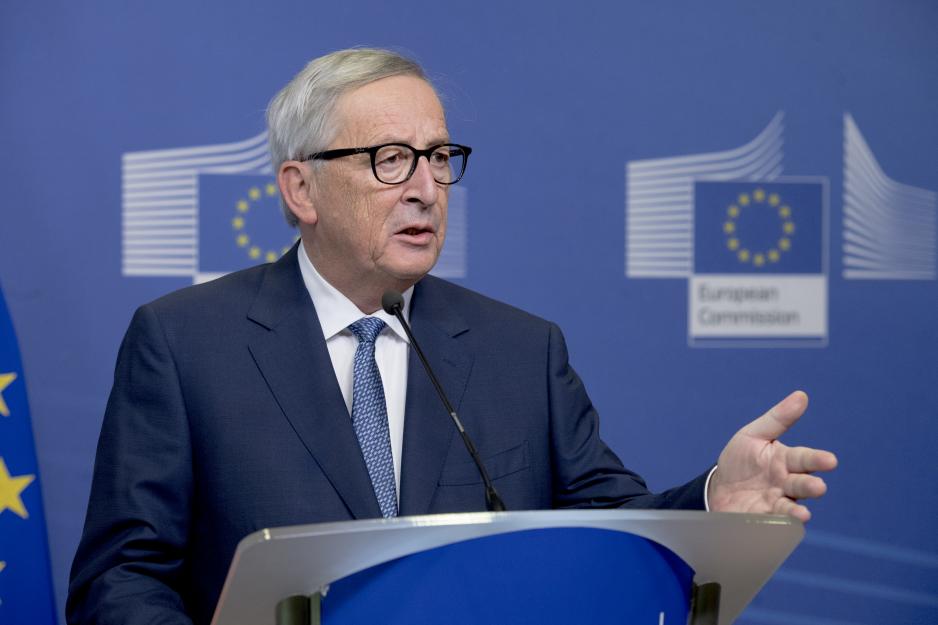Increased Chinese and Russian interest in the Arctic triggers Jean-Claude Juncker: EU President Expedites EU’s Arctic Policy

Jean-Claude Juncker has personally involved himself in the matter so that candidates for the European Parliament may use the new policy paper in their election campaigns. (Photo: The EU Commission)
President of the EU Commission Jean-Claude Juncker now takes a personal initiative to push the Arctic to the frontline through initiating a policy paper about the EU’s Arctic priorities at a time where it definitely was not expected.
Just as we have seen in Norway and Denmark, the EU is now making its way up the political agenda of the EU. Increased Chinese, Russian and American focus on the Arctic has created a stronger need for the EU to secure its role as well as European access to oil, gas and minerals in the High North.
Foreign ministers often repeat that High North politics hold the main priority in Norwegian foreign and security policy. In Denmark, Prime Minister Lars Løkke Rasmussens government has elevated the Arctic as well as relations to Greenland and the Faroe Islands to one out of six top priorities for Danish foreign and security policy in 2019-2020.
And in the EU, President of the EU Commission Jean-Claude Juncker has now personally moved the Arctic issue up on the agenda through initiating a policy paper on the EU’s Arctic priorities at a time when it was not expected. The coming policy paper will now influence political thinking and priorities in Brussels in the time leading up to the establishing of a new EU Commission and a new European Parliament, both of which will assume offices later this year. It will also be included in the complex, Brexit-influenced negotiations about the next EU budget, which are already ongoing.
Jean-Claude Juncker has asked the Finnish diplomat and ambassador Jari Vilen from the Commission’s think-tank European Political Strategy Centre (EPSC) to work out a 20-25 page policy paper with precise guidelines for the EU’s future engagement in the Arctic. This new instrument is to be available as early as the beginning of May, so that it may be used in campaigns for candidates to the European Parliament elections in May if they so desire.
Jari Vilen, who refers to the EPSC as the Commission’s political task force explained the timing of the new policy paper to me when visiting Copenhagen last Friday: “The idea is to build a bridge between the existing and the next Commission. Hopefully it will supply input for the new Commission’s first phase as well as in the birth phase of the next European Parliament”, he says. Vilen holds the title of Senior Advisor for Arctic Policy.
New geopolitics
Jean-Claude Juncker’s desire about a fast new Arctic instrument is in particular caused by two interrelated phenomena: Increased geopolitical interest in the Arctic, and the EU’s need for raw materials that exist in the Arctic.
“The Arctic region’s political significance has increased with geopolitical changes in the Arctic. The political positioning in the Arctic is changed due to increased interest from China and Russia, increased American political demarcations, and because of the need and demand for natural resources like gas, oil, minerals and fish. The Arctic has changed, however, European positions and assessments of how we are to be involved in the Arctic have not. I am trying to argue that the European Union should be ready to take the lead in the Arctic, because if we don’t, others will”, Vilen says.
Following a visit to Finland, which is to take over the EU Chairmanship on 1 July, Iceland and Norway, Jari Vilen was in Denmark last Friday to get advice and input from a.o. the Foreign and Defense ministries, Naalakkersuisut representatives, the Greenland self-rule’s foreign ministry as well as the headquarter of the EU Environmental Agency. China’s growing interest in the Arctic has sparked interest in these offices too.
The authorities in Beijing published its first coherent Arctic white paper early 2018, one that made clear in precise terms how China wants to wield its influence in more or less all areas of the Arctic development. This applies to climate research, raw material extraction, the development of new transport routes and new, international norm-providing regulations and political institutions.
“China’s role in the Arctic is extremely interesting and should necessarily be included in deliberations. The global image forces the EU to be more active in the Arctic and we thus need a more coherent and unifying Arctic policy”, Vilen says.
His observations indirectly correspond with an analysis provided by Austrian researcher Andreas Raspotnik in his 2018 book “The European Union and the Geopolitics of the Arctic”.
Raspotnik writes, amongst others, that “The Arctic is perceived as a neighborhood characterized by growing instability and insecurity – an unpredictability that may alter Europe’s stability in a number of ways. Besides, the effects of climate change are particularly strong in the Arctic while the sources of these changes are primarily external. The conclusion is that European action is inevitable”.
The EU Commission in 2016 adopted its first unifying strategy for a European involvement in the Arctic together with the EU’s foreign ministry; a legally binding Integrated Arctic Policy. Such an overall policy would normally only be revised in four to five years, i.e. half way through the coming Commission’s term, however, Jean-Claude Juncker has seen the need for an earlier update.
The coming Arctic Policy Paper will not be legally binding for the member states, nor will it change the EU’s current policy, however, according to Vilen it will contribute to focusing, clearer priorities and more attention in EU circles.
Oil, gas, minerals
The desire to access the major resources in the Arctic such as oil, gas, minerals, fish, new trade routes and others constitute the second pillar of Vilen’s focus. Geological analyses 10 years ago showed that up to 13 percent of the world’s yet unused oil resources and 30 percent of natural gas resources are expected to be found in the Arctic. In the same way, the Arctic region is rich in a series of minerals considered strategic for the continued development of European industry, as an increasing global shortage thereof is expected. This applies e.g. to the so-called rare earth metals that are used in a series of modern technologies – wind mills, electric cars etc., metals Greenland is known to hold a lot of, but also others. The extracting of these arctic resources is complicated by the vulnerability of Arctic nature – a duality that will be reflected in the upcoming policy paper:
“The European Union will need the resources of the Arctic in the future too, so our Arctic policy should focus on sustainable development. We need oil, we need gas, but the Arctic region is very vulnerable. So whatever we do there, must happen with the best technology available and with regard to the frailty of Arctic nature. If we look at it from a positive perspective, the Arctic can be considered a lab for sustainable economic activity that can be spread out to all of Europe”, Vilen explains.
Under the two thematic headlines of geopolitics and resources, he has pointed out four further themes that will act as prioritized indications: climate changes, research and innovation, connectivity (internet, trains, planes, roads, infrastructure) and the demographic challenges in the Arctic; the urbanization of the Arctic creates new challenges both in cities as well as in already sparsely inhabited rural areas.
Research received a prominent place in the EU’s Arctic policy as early as in 2016, and the focus on research is now sharpened. Research and innovation is the only policy area that, according to the currently proposed next seven-year budget for the EU, can look forward to increased allocations. Arctic research can, according to Vilen, look forward to a particular recommendation in the upcoming policy paper:
The next EU budget frame and its ensuing investments in research should have a particular Arctic angle”, he says. Just like many of the Arctic governments, he envisions two particular purposes. Research and innovation initiatives should contribute to finding answers to climate change while also securing the EU countries’ participation in sustainable exploitation of the resources in the Arctic:
“Research and innovation is in our Arctic policy considered a means to increasing opportunities to exploiting natural resources in a sustainable manner and as an answer to the challenges presented by climate change” he says.
EU important in the Arctic
The EU does not hold a formal seat in the Arctic Council, the key political body for the eight Arctic states and the Arctic peoples. Japan, South Korea and a series of European countries hold observer status in the Council, however, Russia is blocking the EU’s application for observer status as part of the sanction war with the EU following the Russian annexation of the Crimea. According to Vilen, however, that does not really represent an obstacle to EU’s involvement in the Arctic:
“It has not affected the EU’s involvement in any way. We continue to work as de facto observer in the working groups, much of these groups’ information comes from the EU Commission’s bodies, as does much of the funding of various projects. So we’re in. Our de jure position is not in place, however, our de facto position is,” he says.
The EU has played an important if diffuse role in the Arctic for many years. EU Member States Sweden and Finland consist in part of Arctic land areas regulated by EU legislation. The Kingdom of Denmark also includes the Faroe Islands and Greenland, and while they are both outside the EU, they are both influenced by the EU through the Danish membership and through a series international agreements holding significance for the North Atlantic region.
Greenland, as the only one among the EU’s Overseas Countries and Territories, holds a particular position in the EU’s budget and has for a long time received fixed income from fisheries agreements and a particular partnership agreement with the EU. Norway and Iceland are both, as is well known, a part of the EEA and thus the EU’s inner market. The EU is an important market for fish, shrimps, minerals, gas etc. from the Arctic and a key sponsor of Arctic research.
The EU’s participation in regulating fisheries, shipping and oil and gas extraction in the Arctic as well as industry production in EU countries constantly contributes to the air pollution in the Arctic that accelerates climate change.
This article originally appeared in Danish and has been translated by HNN's Elisabeth Bergquist

